- Home
- Simon Kernick
Relentless: A Novel Page 18
Relentless: A Novel Read online
Page 18
It was the most difficult piece of surveillance Bolt had ever overseen. The targets had been trained in anti-surveillance techniques, and during the forty-five-minute journey through the centre of the city they’d double-backed, performed illegal U-turns, had at times hit speeds of seventy miles per hour down Islington backstreets (a near physical impossibility, and something Bolt had never seen since), and had even gone the wrong way up a one-way street. All to make sure they avoided being followed. They were almost successful too, but somehow, using a combination of CCTV cameras and a lot of shouting down various different phones, Bolt kept them covered all the way to their destination – a basement flat in Fulham.
Bolt scrambled all available officers to the flat, and at the same time called up SO19 specialist firearms units to assist in any possible rescue.
It was his call. Should he adopt a wait-and-see approach, or should he go in hard, assuming that the girl was in the flat as well? He was well aware that the kidnappers could kill the girl and her father even as he waited. The Russian mafia were ruthless operators.
In the end, Bolt decided on a third way. He got British Telecom to supply him with the number of the flat’s landline, and, with the firearms team in place, he phoned the kidnappers from his control room at Scotland Yard, assuming that curiosity would lead to one of them picking up. He guessed right. The kidnappers’ leader did the honours, and in a marked departure from the rulebook Bolt told him that he was never going to get the deeds to the hotel, he was never going to sell them on, he was never going to escape from the situation he’d put himself in, because no-one in Britain ever negotiated with kidnappers, and if he killed either of his prisoners he’d never see the outside of a prison again. However, if he released them both unharmed, there was a possibility that a judge would treat the case leniently. He said all this before the man on the other end had a chance to reply, and it was a massive gamble because the girl might already have been dead: having alerted the kidnappers to the fact that the police had them in their sights, they might have decided they had nothing to lose by going for a shoot-out. Bolt wouldn’t have called himself a gambler by nature, but he was decisive, and not afraid to take responsibility for his actions. And, on that particular occasion, it worked. The kidnappers were badly spooked, and after further telephone negotiations, during which Bolt repeated the fact that they were surrounded and didn’t have a leg to stand on, they surrendered, releasing both prisoners unharmed.
Stanevic had never forgotten what Bolt had done, and credited him with saving both his and his daughter’s life. They’d remained in occasional contact after that, and when Stanevic heard that Bolt was looking for a place to live, he’d offered to help out by letting him stay in one of his properties rent-free for as long as he liked. Bolt should have said no since it was against all the rules, and was a sackable offence if anyone ever found out. But at the time, pissed off with life, not too bothered with what the rulebook said and, most importantly, flat broke, he’d accepted, although with one proviso: he wanted to pay something at least. Stanevic didn’t want to accept a penny, but Bolt didn’t want to feel like he was in hock to anyone, and they’d finally agreed on the £150 figure, with Bolt moving in soon afterwards.
It had just turned midnight when, having trudged up the stairs to the third floor with a bag full of Thai food, he finally closed the front door of his apartment behind him. Coming back to the dark emptiness of his home occasionally gave him a deflated feeling, particularly after he’d had a busy day, and tonight was one of those nights. As he turned on the hall light, he thought of Tina Boyd, of the loneliness he’d seen in her dark eyes, and wondered if the same emotion had been reflected in his.
He put the bag on one of the metallic kitchen tops and cracked open a Stella from the fridge, taking a much-needed gulp straight from the can. He moved into the middle of the room, away from the kitchen area, and stood in the semi-darkness, looking through the window at the orange glow of the city at night, savouring the faint sounds of people and traffic from the street below as they rose up to drive away his gloom. Bolt had lived in London for almost twenty years, and he still felt a frisson of excitement whenever he stood here, knowing that he was in the centre of one of the oldest, most vibrant cities in the world. Plenty of people criticized London, and he’d be the first to admit that there were things wrong with it – the horrendous crime rate, for one – but he still couldn’t imagine living anywhere else. It gave him a sense of security and belonging that he couldn’t quite explain, but which, to him, were as tangible and obvious as the wooden floor he was standing on. The city was his crutch.
He was used to being on his own now. Although it had been thrust upon him suddenly and in a way that no-one would ask for, he found that it quite suited him. He didn’t have to justify his comings and goings, could cook what he wanted when he wanted, and could make as much noise as he liked. The location, with so much on his doorstep, also assuaged the worst of the loneliness and melancholy that afflicted him whenever he thought too much about that night three years ago. And for the moment, at least, he had no desire to change his situation.
Or so he liked to convince himself.
He was just serving up the food – sea bass in tamarind sauce with coconut fried rice – and taking another long pull on the can of Stella when his mobile rang.
It was Turner. He told Bolt he’d been out to the cinema and had only got back a little while earlier. He’d been to see the new Tom Cruise movie. ‘It was bloody terrible as well. And the girl I took said she was really tired and wanted to go home straight afterwards. I think the film put her off relationships for life.’
Bolt leaned back against the kitchen top and drank again from the can. ‘Ah, my friend, there’s no justice in this world.’
‘Too right, and life’s too short to waste evenings like that. I ought to sue.’
‘Who? The girl or the film company?’
‘Both.’
Bolt laughed. He liked Turner. The guy was an acquired taste, there was no doubting that, and clearly his date tonight hadn’t acquired it. Prematurely balding, with a long, hangdog face, he rarely bothered with a smile, preferring to rely on a bone-dry, cynical wit that was always delivered in the same deadpan manner. Why he’d chosen to be a copper was anyone’s guess. He certainly didn’t attempt to connect with the general public, who he viewed with a general disdain bordering on dislike. But he was bright, could pick up bullshit a mile off, and was an expert with computers. Plus, he was dedicated enough to phone his boss back after midnight on a weekend.
‘You obviously got my message, then. Have you had a chance to look at Parnham-Jones’s laptop yet?’
‘There wasn’t one.’
‘Do we know whether or not he used a laptop?’
‘Not at the moment, no. I just assumed he didn’t. We can easily find out, one way or another.’
‘I’ll call his cleaner tomorrow.’
‘There was a PC, though. I had a quick look at it this afternoon, but when I got your message tonight I had a much closer inspection.’
‘Anything on it of interest?’
‘Yes,’ Turner said after a pause. ‘There is.’
Bolt tensed. ‘Go on.’
‘There’s an email. It was saved in a folder in his personal filing cabinet, the only thing in there. What caught my attention was that it was password-protected. I broke through the security easy enough – it wasn’t designed to deter anyone who knew what they were doing – and I’ve just finished reading it now. It’s a blackmail note.’
‘Have you got it in front of you? I’d like to hear what it says.’
‘It’s short and to the point. “Dear Lord Chief Justice. We know everything. All the details. 1998. The girl. Her father’s dead too, isn’t he? Hanged himself in jail. If you want to avoid spending the rest of your days rotting behind bars as well then we will need to make some arrangements. Otherwise we’re going public. You will be hearing from us soon.”’ Turner paused again, but Bo
lt didn’t say anything. ‘And that’s it,’ he added. ‘I’ve no idea what he’s meant to have done. There’s no other mention of anything untoward anywhere else on the PC that I can find, and no other emails from the blackmailer.’
‘Have you checked Parnham-Jones’s Internet history?’
‘I’ve had a cursory look. He doesn’t seem to surf the net too much, and none of the sites are out of the ordinary. Amazon, the BBC, stuff like that. And he likes to read articles about himself. Were you expecting to find something else, then?’
‘No,’ Bolt lied. ‘Just checking.’ He was still thinking about the absence of a laptop. Could Parnham-Jones have had one which he used for his more nefarious pursuits? Perhaps one that had been stolen by his murderer, as appeared to be the case with John Gallan?
‘I’ve just forwarded the mail to you,’ Turner told him.
‘No idea who it’s from, I suppose?’
‘The address is a hotmail account. It’s already been closed down, and if the blackmailer knows what he’s doing he’ll have sent it from an Internet café, which means it’s going to be very difficult to track down.’
‘But you can tell when it was sent, can’t you?’
‘Yes, it’s dated the eleventh of May. Ten days ago.’
Recent, then, and almost certainly connected to Parnham-Jones’s death.
‘I suppose this puts a different slant on things, doesn’t it?’ said Turner rhetorically.
‘It certainly does.’
‘No idea what that bit about the dead girl and her father is all about?’
‘Not yet,’ answered Bolt, lying for a second time. He asked Turner to continue his search of the PC’s hard drive to see if there was anything on there that could be connected to the ransom note, thanked him and hung up.
He looked down at his food with only vague interest. It smelled good, but he was too busy thinking about this latest information. He was convinced now that the Lord Chief Justice had been murdered. He was also nearly certain that John Gallan had been murdered by the same person or persons several months earlier. The connections between the two were too great for it to be otherwise. Gallan’s murder had surely been carried out to put an end to his investigation into the allegations of paedophilia and murder that had been levelled against Parnham-Jones, but this begged the question why Parnham-Jones had also been murdered. It could have been to silence him and therefore prevent his potentially explosive secrets being made public. In which case the killer was likely to be one of his fellow paedophiles, or possibly even someone from within the establishment trying to snuff out a potential government-toppling scandal.
But this theory begged another question. The person with the most obvious motive for killing Parnham-Jones (i.e. to hush up the scandal) would not have been blackmailing him. Quite the reverse. He would have been going out of his way not to panic him into foolish action.
So who the hell had sent the email?
34
It was just after 3 a.m. and the street was silent.
A black cat crept out of the bushes near Irene Tyler’s front door, took one disdainful look at the masked man in black who’d loomed up in the darkness, and scuttled across his path before disappearing. Lench couldn’t remember whether such a thing was a sign of good or bad luck, nor did he care. He wasn’t superstitious, and always marvelled at the rank naivety of those who were. Individuals made their own destiny by their actions alone. Luck was random. There was no afterlife, no spiritual world. If there had been, Lench would have been haunted by the ghosts of each and every one of the forty-three people he’d murdered in his lifetime, and yet he slept soundly each night and felt at home in the darkness.
He removed the skeleton keys from his pocket and started on the five-bar lock on the front door. It took just under a minute to undo. Then it was the turn of the Yale lock, which took a matter of seconds. Slowly, he pushed the door open. It was on a chain. He slid the bolt cutters from his pocket and cut it in the middle. Irene Tyler was obviously more security-conscious than most, but it made no difference. Any house could be broken into if the intruder knew what he or she was doing, and Lench had had plenty of lessons. He’d seen that the property had a burglar alarm as he approached it, so now he pocketed the bolt cutters and took out a laser pen. These days, a lot of homeowners turned on their burglar alarms at night, activating the ground-floor sensors only, and given the fact that she’d double-locked the door and put the chain across he had to assume that Irene Tyler had probably done the same. Inching his way through the door and into the hallway, Lench spotted the flashing motion detector on the wall to his right. After a couple of seconds’ careful manoeuvring, the laser pen’s beam found the centre of the detector’s red light, effectively blinding it.
Shutting the front door with his foot, Lench kept the beam in exactly the same position and moved sideways across the floor, one easy step at a time, until he reached the bottom of the staircase. He mounted the first three steps until the angle of the laser became too narrow to keep still, but he knew that by this time he was safe. He switched it off, replaced the pen in his pocket and carried on climbing.
He found Irene Tyler’s room on his first try. It was spacious and warm, and he could see her in the eerie blue-white light of the streetlamp outside. She was lying on her left side, tucked up beneath the covers of her double bed, her long silver hair loose, snoring lightly. He shut the door behind him and crept wraith-like over to the bed, his heavy boots making barely a sound. He could smell her vaguely perfumed scent. She was perhaps sixty-five, her skin lined and sagging a little at the jaw, but she was not unpleasant to look at.
He leaned down until he was only inches from her face, so close now that he could suck in her deep, slumbering breaths. His eel-like tongue slipped out from his mouth, its tip creeping along the line of her aquiline nose, almost, but not quite, touching it. He so desperately wanted to lick her, to taste the warmth of her skin, as he’d done sometimes with his female victims back in the anarchy of Bosnia, an intimate gesture that he believed drew him closer to them, and thereby increased his power when he finally snuffed out their lives.
But he had to be careful tonight, knowing that he couldn’t afford to leave any trace of DNA. Instead, he pushed back her silver hair and touched a gloved finger to her fleshy earlobe. Irene flinched but didn’t wake up, so he rammed the finger into her ear and that did the trick. Her eyes shot open and she tried to sit up but he shoved her back down and put a hand over her mouth. With the other hand he produced a long stiletto knife which he gently ran across her throat.
‘Is the burglar alarm on?’ he hissed. ‘Nod your head for yes, shake it for no.’
She made some muffled noises and nodded her head.
‘When I remove my hand, you’re going to give me the code. If you delay or give me the wrong one, I’m going to cut one of your eyes out.’
He spoke calmly, almost with reassurance, in a slightly high-pitched Home Counties accent which utterly belied his huge, looming bulk and somehow made the words he spoke even more terrifying. The knife slid across the skin until the tip was pressed against the loose fold of skin just beneath her right eye. There was no doubt whatever that his threat was serious, and she nodded again, this time to show she understood. Lench’s hand slipped away from her face, although the knife remained where it was, causing her to squint.
‘Five-two-eight-one.’
‘Good.’ He took the knife away. ‘Turn over.’
‘Take what you want, but please don’t hurt the children.’
So they were here. That was useful. ‘I’m not interested in them,’ he lied, keen to secure her co-operation. ‘Now, do what I say.’
She rolled over onto her front and he produced two pairs of plastic restraints, one of which he used to bind her wrists, the other her ankles. She didn’t resist, but repeated that he could take anything he wanted as long as he didn’t hurt her grandchildren. ‘Open your mouth wide,’ he told her, and when she did so he slipped in a g
olfball, which he secured in place with a piece of masking tape.
When he was satisfied that she was helpless, he left the room and went back down the stairs. He allowed the motion detector to pick up his movement this time, and the alarm went off in the house. He made his way over to the keypad and fed in the numbers, automatically turning it off.
Now he was ready to move. Pulling a mobile from his pocket, Lench made a quick call. ‘Bring the van round the front in one minute and keep the engine running,’ he told the person at the other end, before starting up the stairs again. The people he was using tonight were reliable, and proven killers, but he also knew they had grave doubts about involving children. Lench considered this a weakness. In his world, there was no such thing as a boundary that could not be crossed. It was one of the lessons he’d learned during his four years in the killing fields of the former Yugoslavia, fighting for whichever side paid him the most money. Everyone, young and old, was potential prey. All just bags of blood. But not everyone understood that, and in order to stave off any potential mutiny from his men he’d had to double their money for the night’s work.
The boy and girl were fast asleep in a bunk bed in the back bedroom, which had been decorated with Disney characters on the walls and was full of toys and fluffy animals. It was obvious, even to someone like Lench, that Irene Tyler doted on them. He crept through the gloom and lifted the boy from the top bunk. He stirred but didn’t wake, and Lench carried him silently through the house. He could hear Irene Tyler writhing around on her bed through the door, but knew she was in no position to do anything.
As he approached the front door, he heard the Bedford van pull up outside. He pushed open Irene Tyler’s front door with his foot and hurried down the path, the child asleep in his arms. There were two men in the van, and the passenger got out and opened the double doors. He was no longer wearing a balaclava but had a baseball cap pulled down low over his forehead to avoid detection. In the back of the van were two bare mattresses. Lench placed the boy on one, then headed back inside, checking for lights in any of the neighbouring houses. There were none.

 Die Alone
Die Alone Deadline
Deadline The Final Minute
The Final Minute We Can See You
We Can See You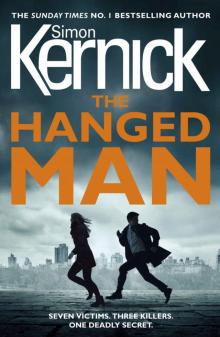 The Hanged Man (Bone Field 2)
The Hanged Man (Bone Field 2) Dead Man's Gift 02 - Last Night
Dead Man's Gift 02 - Last Night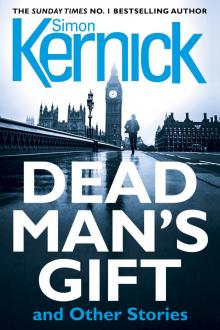 Dead Man's Gift and Other Stories
Dead Man's Gift and Other Stories A Good Day To Die
A Good Day To Die The Last 10 Seconds
The Last 10 Seconds The Murder Exchange
The Murder Exchange The Bone Field
The Bone Field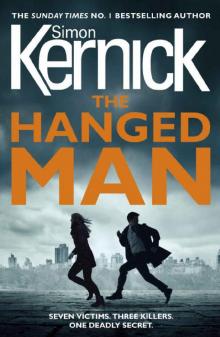 The Hanged Man
The Hanged Man Target
Target The Last 10 Seconds: A Novel
The Last 10 Seconds: A Novel Relentless: A Novel
Relentless: A Novel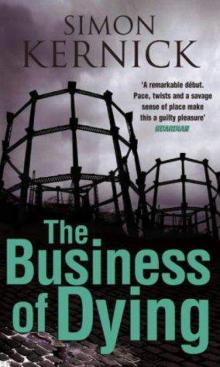 The Business Of Dying
The Business Of Dying Die Twice
Die Twice Flytrap
Flytrap Stay Alive
Stay Alive Dead Man's Gift 03 - Today
Dead Man's Gift 03 - Today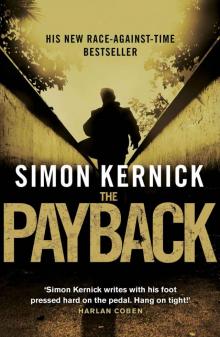 The Payback
The Payback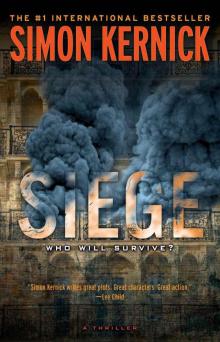 Siege: A Thriller
Siege: A Thriller The Crime Trade
The Crime Trade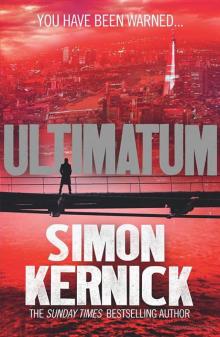 Ultimatum
Ultimatum